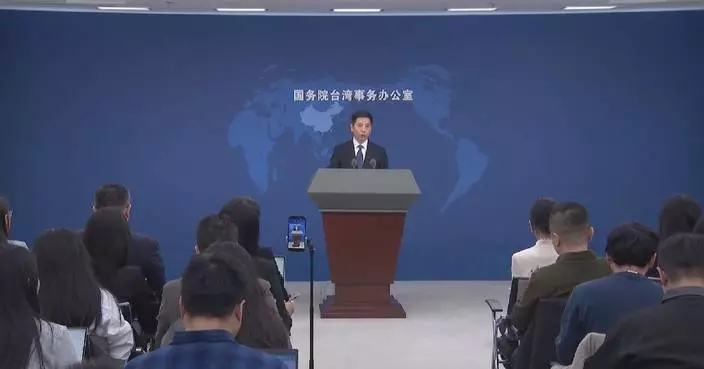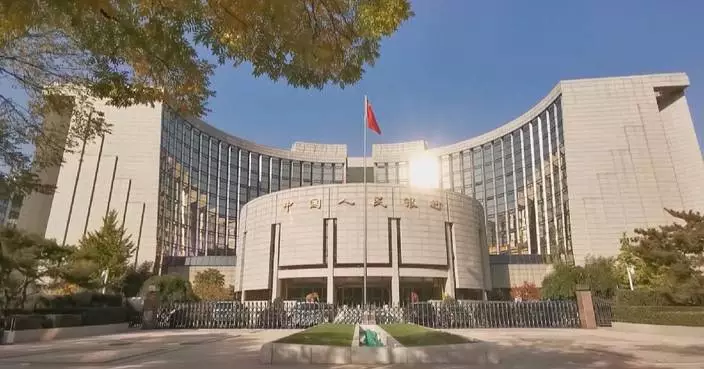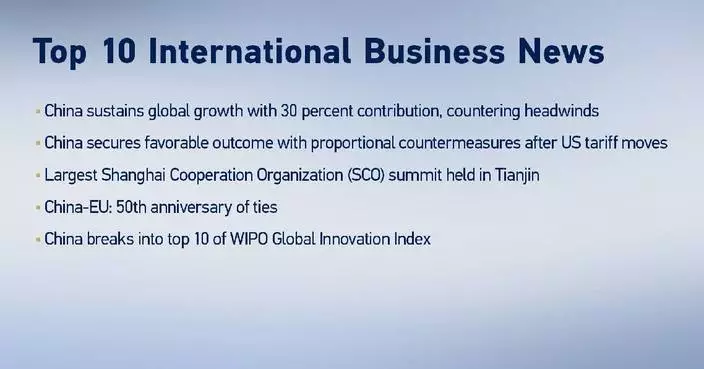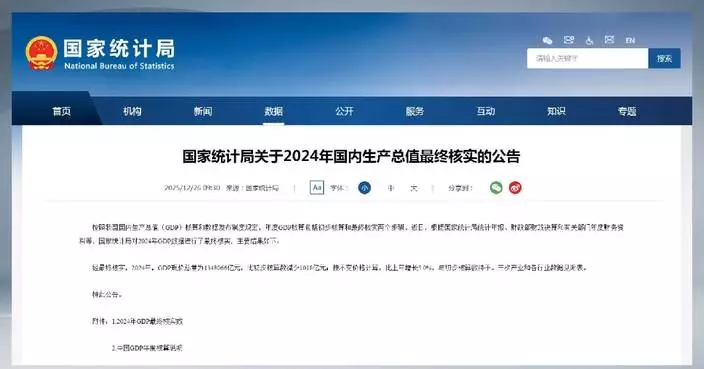Feature · News

China opposes external interference in Venezuela's internal affairs under any pretext

China calls for joint efforts to contain revival of Japanese militarism

China strongly opposes U.S. Section 301 tariffs on Chinese semiconductors

Zelensky holds phone conversation with U.S. envoys as Russia analyzes peace proposal

Spokesman slams Taiwan DPP authorities for selling out island's competitive industries

Japan's nuclear ambition must be resolutely stopped: commentary

China's 5G user penetration rate surges to 83.9 pct

BP China Insight : U.S. Sanctions Ex-EU Official Who Sought to Be Washington's Loyal Ally

China's offshore RMB climbs past seven per US dollar benchmark

China accelerates green packaging in express delivery

New storm hitting waterlogged Southern California could bring mudslides and high surf

Takaichi's possible Yasukuni Shrine visit raises concerns in South Korea

Photos of Christmas celebrations around the world

Saudi Arabia urges Yemen's separatists to leave 2 governorates as the anti-rebel coalition strains

Photos show Venezuelan migrants spending Christmas at home after abandoning hope of reaching the US

A Venezuelan family's Christmas: From the American dream to poverty
China's 5G user penetration rate surges to 83.9 pct

BP China Insight : U.S. Sanctions Ex-EU Official Who Sought to Be Washington's Loyal Ally
China's offshore RMB climbs past seven per US dollar benchmark
China accelerates green packaging in express delivery
China opposes external interference in Venezuela's internal affairs under any pretext
China calls for joint efforts to contain revival of Japanese militarism
China strongly opposes U.S. Section 301 tariffs on Chinese semiconductors
Zelensky holds phone conversation with U.S. envoys as Russia analyzes peace proposal
Spokesman slams Taiwan DPP authorities for selling out island's competitive industries
Japan's nuclear ambition must be resolutely stopped: commentary

New storm hitting waterlogged Southern California could bring mudslides and high surf
Takaichi's possible Yasukuni Shrine visit raises concerns in South Korea

Photos of Christmas celebrations around the world

Saudi Arabia urges Yemen's separatists to leave 2 governorates as the anti-rebel coalition strains

Photos show Venezuelan migrants spending Christmas at home after abandoning hope of reaching the US

A Venezuelan family's Christmas: From the American dream to poverty
Feature·Bloggers

【Bastille Commentary】Green Nails? The Lie No Lawyer Would Touch

【What Say You?】How Jimmy Lai's Right-Hand Man Ran a Corporate Shakedown Operation

【Deep Blue】Trump's "Empire Strikes Back" Gambit: A Long Shot at Best

【What Say You?】Unfinished business With the “anti-Hong Kong triangle”?

【Bastille Commentary】UK's Hypocrisy on Display: Seizing Private Assets While Preaching Freedom

【What Say You?】London’s Selective Memory on National Security

Korean prosecutors seek 10-year sentence for ousted President Yoon in first martial law trial
- Former Malaysian Prime Minister Najib Razak convicted in trial over 1MDB corruption scandal
- Zelenskyy says meeting with Trump to happen 'in the near future'
- Trump says US struck Islamic State targets in Nigeria after group targeted Christians
- South Korea vows to end foreign adoptions as UN presses Seoul to address past abuses
- What to know about the militants targeted by US airstrikes in northwest Nigeria
- Rain-soaked California still at risk of floods and high surf
- Hawaii's Big Island bans feeding feral cats in an effort to help endangered native species
- Myanmar will hold its first general election in 5 years as criticism of the military rule mounts
- The top photos of the week by AP’s photojournalists

China's film market sustains strong growth in 2025
- Chinese shares close higher Friday
- China launches national venture capital guidance fund
- Online shoppers in South Africa face financial fraud, identity theft risks
- ROK special counsel seeks 10-year prison sentence for ex-president Yoon on charges of arrest obstruction: media
- China's digital industry revenue up about 9 pct in 2025
- Int'l analysts condemn Japanese prime minister's 'warlike', 'dangerous' remarks
- China's industrial output to grow by 5.9 pct in 2025
- Japan's defense budget tops record 9 trln yen for fiscal 2026
- Hong Kong's shopping districts buzz with holiday spirit

Z.ai Open-Sources GLM-4.7, a New Generation Large Language Model Built for Real Development Workflows
- NIA Joins Forces with TAT to Reignite ‘Amazing Thailand’ Through Innovation Power, Transforming Thai Tourism and Leveraging Creativity and Culture to Drive a New Tourism Economy
- TutorABC Launches 12 Specialized Industry Curriculums to Power Global Workforce Transformation
- AR Accessibility Research Wins AIS Impact Award 2025 with Support from LLVision Smart Glasses
- A Holiday Christmas Magic: Coca-Cola Bridges Miles by Bringing "Sound of Home" to Overseas Filipino Workers in Australia
- Syntec Technology Launches Phase II Development of Malaysia Manufacturing Facility with Investment of Over RM78 Million
- SKIP THE KITCHEN STRESS: FOUR POINTS SINGAPORE BRINGS RESTAURANT-QUALITY LUNAR NEW YEAR FEASTS STRAIGHT TO YOUR TABLE
- Apical Strengthens Women’s Health to Support Stunting Prevention in Cilincing, North Jakarta
- SINBON Brings Enhanced EV Connection Solutions to Automotive World Tokyo 2026
- Arspura Showcases a New Standard for Healthy Kitchen Living at CES 2026

Virtual reality opens doors for older people to build closer connections in real life
- Pro-Russian hackers claim cyberattack on French postal service
- What's an atmospheric river? AP explains the weather phenomenon
- Starlink in the crosshairs: How Russia could attack Elon Musk's conquering of space
- Japan's new flagship H3 rocket fails to put geolocation satellite into orbit
- The rise of deepfake cyberbullying poses a growing problem for schools
- Boys at her school shared AI-generated, nude images of her. After a fight, she was the one expelled
- These influencers are teaching Christianity online — and young people are listening
- Doctor's orders? ‘Belly laugh at least two to five days a week'
- PHOTO ESSAY: Invisible infrared surveillance technology and those caught in its digital cage

Afghanistan's historic Ariana Cinema torn down to make way for shopping center
- From red donkeys to vibrant art: Fernando Dávila's colorful journey as a colorblind painter
- ‘Heated Rivalry’ series mixes hockey and queer romance and is scoring big audiences
- Mohammad Bakri, renowned and controversial Palestinian actor and filmmaker, dies at 72
- Kennedy Center Christmas Eve jazz concert canceled after Trump name added to building
- How Christian artists are winning over listeners and entering pop's mainstream
- Sean 'Diddy' Combs seeks immediate release from prison in appeals argument
- Venus Williams weds Andrea Preti in Florida as part of a 5-day celebration of their union
- UK authorities bring new charges of rape and sexual assault against Russell Brand
- Ukraine's own 'Dancing with the Stars' is back on for a special episode with wartime heroes

Ashes advantage England: Visitors take 4 Australian wickets after winning the toss at the MCG
- Jokic's 56-point triple-double powers Nuggets past Timberwolves in OT
- Minnesota looks to stretch bowl winning streak to 9 when it faces New Mexico in Rate Bowl
- Spurs beat Thunder 117-102 for 3rd win over defending NBA champs in 2 weeks
- Travis Kelce's emotional night at Arrowhead Stadium may be his last with retirement decision looming
- Nix's late TD pass and stand by Broncos defense finishes off 20-13 win over Chiefs
- Left fielder Tyler Soderstrom reaches $86M, 7-year agreement with Athletics, AP source says
- Pro Picks: Bills will edge Eagles and 49ers will beat the Bears
- Amen Thompson's 26 points lead Rockets to 119-96 win over Doncic and the Lakers
- Lions eliminated after Goff's uncharacteristic giveaways in loss that sends Packers to playoffs

Hong Kong Government Thanks Local and Global Support After Wang Fuk Court Fire Tragedy
- Dengue and Chikungunya Fever Update: Health Authorities Urge Mosquito Bite Prevention Measures Amid Rising Cases
- New melioidosis case reported in Hong Kong; public urged to maintain hygiene and avoid muddy water after storms.
- Experience Hong Kong's Film Culture at Yau Ma Tei Police Station Exhibition Opening January 2, 2026
- Mirs Bay in Hong Kong Recognized as Outstanding Example of Beautiful Bays for Marine Ecological Protection Efforts
- Special New Year's Eve Transport and Boundary-Crossing Arrangements Announced for Hong Kong and Mainland Travel
- Government Task Forces Mobilize for Wang Fuk Court Fire Relief and Investigation Efforts
- Hong Kong Reports No New Chikungunya Cases, Intensifies Mosquito Control Efforts in Affected Areas
- Correctional Services Department Hosts Christmas Activities for Persons in Custody with Religious Leaders' Support
- Correctional Officer Prevents Suicide Attempt at Lo Wu Correctional Institution on Christmas Morning

Chinese yuan strengthens to 7.0358 against USD Friday
- China's installed power capacity sees steady expansion
- New measures rolled out to facilitate construction of western land-sea trade corridor: official
- New high-speed railway in northwest China's Shaanxi goes into operation
- Expressway traversing north, south Xinjiang opens to traffic
- China revises preliminary calculation of 2024 GDP
- Russia reports multi-directional strikes against Ukraine, Ukraine claims strikes on key facilities in Russia
- Hainan FTP sees 4 bln yuan in zero-tariff goods imported during 1st week of special customs operations
- Japanese civil groups urge gov't to ban arms exports
- Avatar 3 star highlights emotional depth of blockbuster film
Category · News

Hong Kong Government Thanks Local and Global Support After Wang Fuk Court Fire Tragedy

Z.ai Open-Sources GLM-4.7, a New Generation Large Language Model Built for Real Development Workflows

NIA Joins Forces with TAT to Reignite ‘Amazing Thailand’ Through Innovation Power, Transforming Thai Tourism and Leveraging Creativity and Culture to Drive a New Tourism Economy

Korean prosecutors seek 10-year sentence for ousted President Yoon in first martial law trial

Dengue and Chikungunya Fever Update: Health Authorities Urge Mosquito Bite Prevention Measures Amid Rising Cases

New melioidosis case reported in Hong Kong; public urged to maintain hygiene and avoid muddy water after storms.

Former Malaysian Prime Minister Najib Razak convicted in trial over 1MDB corruption scandal
China's film market sustains strong growth in 2025

Zelenskyy says meeting with Trump to happen 'in the near future'

Trump says US struck Islamic State targets in Nigeria after group targeted Christians
Chinese shares close higher Friday

China launches national venture capital guidance fund
Online shoppers in South Africa face financial fraud, identity theft risks
ROK special counsel seeks 10-year prison sentence for ex-president Yoon on charges of arrest obstruction: media

TutorABC Launches 12 Specialized Industry Curriculums to Power Global Workforce Transformation
China's digital industry revenue up about 9 pct in 2025
Int'l analysts condemn Japanese prime minister's 'warlike', 'dangerous' remarks
China's industrial output to grow by 5.9 pct in 2025
Hong Kong's shopping districts buzz with holiday spirit
Japan's defense budget tops record 9 trln yen for fiscal 2026

Ashes advantage England: Visitors take 4 Australian wickets after winning the toss at the MCG
Chinese yuan strengthens to 7.0358 against USD Friday

South Korea vows to end foreign adoptions as UN presses Seoul to address past abuses

Jokic's 56-point triple-double powers Nuggets past Timberwolves in OT

Minnesota looks to stretch bowl winning streak to 9 when it faces New Mexico in Rate Bowl
China's installed power capacity sees steady expansion

U.S. blockade of Venezuela act of piracy: Russian spokeswoman
Russian strategic bombers conduct scheduled flight over neutral waters
New measures rolled out to facilitate construction of western land-sea trade corridor: official

Experience Hong Kong's Film Culture at Yau Ma Tei Police Station Exhibition Opening January 2, 2026

What to know about the militants targeted by US airstrikes in northwest Nigeria

AR Accessibility Research Wins AIS Impact Award 2025 with Support from LLVision Smart Glasses

Mirs Bay in Hong Kong Recognized as Outstanding Example of Beautiful Bays for Marine Ecological Protection Efforts

Spurs beat Thunder 117-102 for 3rd win over defending NBA champs in 2 weeks

Travis Kelce's emotional night at Arrowhead Stadium may be his last with retirement decision looming

Afghanistan's historic Ariana Cinema torn down to make way for shopping center

Nix's late TD pass and stand by Broncos defense finishes off 20-13 win over Chiefs

Rain-soaked California still at risk of floods and high surf

From red donkeys to vibrant art: Fernando Dávila's colorful journey as a colorblind painter

Hawaii's Big Island bans feeding feral cats in an effort to help endangered native species

‘Heated Rivalry’ series mixes hockey and queer romance and is scoring big audiences

Left fielder Tyler Soderstrom reaches $86M, 7-year agreement with Athletics, AP source says

A Holiday Christmas Magic: Coca-Cola Bridges Miles by Bringing "Sound of Home" to Overseas Filipino Workers in Australia
New high-speed railway in northwest China's Shaanxi goes into operation

Pro Picks: Bills will edge Eagles and 49ers will beat the Bears
Expressway traversing north, south Xinjiang opens to traffic

Myanmar will hold its first general election in 5 years as criticism of the military rule mounts

Amen Thompson's 26 points lead Rockets to 119-96 win over Doncic and the Lakers

Lions eliminated after Goff's uncharacteristic giveaways in loss that sends Packers to playoffs

Syntec Technology Launches Phase II Development of Malaysia Manufacturing Facility with Investment of Over RM78 Million

Defending champion LawConnect leads yachts out of Sydney harbor in annual ocean race to Hobart

Vikings eliminate Lions with defense-dominating 23-10 victory, racking up 6 turnovers and 5 sacks
China revises preliminary calculation of 2024 GDP
Russia reports multi-directional strikes against Ukraine, Ukraine claims strikes on key facilities in Russia

SKIP THE KITCHEN STRESS: FOUR POINTS SINGAPORE BRINGS RESTAURANT-QUALITY LUNAR NEW YEAR FEASTS STRAIGHT TO YOUR TABLE

Apical Strengthens Women’s Health to Support Stunting Prevention in Cilincing, North Jakarta
China launches new batch of internet satellites into orbit using Long March-8A rocket

Stephen Curry, Jimmy Butler lead the way as Warriors beat Mavericks 126-116 on Christmas Day

JJ Redick's kids write persuasive essays to earn their biggest Christmas gifts

Croskey-Merritt's 105-yard rushing performance gives Commanders hope for future

Dallas center Anthony Davis leaves with groin injury

SINBON Brings Enhanced EV Connection Solutions to Automotive World Tokyo 2026

Chiefs' injury woes continue as top return man Nikko Remigio lands on IR

Broncos place center Luke Wattenberg on IR in surprising blow to offensive line

Dak Prescott throws for 307 yards and 2 TDs to lead Cowboys past skidding Commanders 30-23

Lamar Jackson doubtful and Jordan Love questionable for Ravens-Packers game Saturday

Evan Mobley makes a quick return from a calf strain to rejoin the Cavaliers in loss on Christmas

Tyler Kolek chases down Donovan Mitchell for a block and helps the Knicks catch the Cavaliers

The top photos of the week by AP’s photojournalists

Brunson and the reserves lead a Christmas comeback as the Knicks beat the Cavaliers 126-124

The Kremlin says Moscow made an offer to France regarding a French citizen imprisoned in Russia

Brazilian ex-President Jair Bolsonaro undergoes double hernia surgery
Hainan FTP sees 4 bln yuan in zero-tariff goods imported during 1st week of special customs operations

Jaguars CB Jourdan Lewis to have season-ending foot surgery, AP source says

Jimmy Kimmel jokes about fascism in an 'alternative Christmas message' for Britain

Russian court sentences pro-war activist and Putin critic to 6 years in prison

Arspura Showcases a New Standard for Healthy Kitchen Living at CES 2026
Japanese protesters rally against arms exports in Tokyo

Pope Leo XIV urges the faithful on Christmas to shed indifference in the face of suffering

Vingroup Signs Strategic Cooperation with The Government of Uzbekistan, Opening Large-Scale Investment Opportunities in Central Asia

Somalis vote in the first one-person, one-vote local election in decades

John Robertson, two-time European Cup winner with Nottingham Forest, dies at 72

HTX Earn Fully Upgraded: Join HTX Earn Carnival, Earn Up to 15% APY and Apple Product Rewards

HTX Year-End Carnival Launches 200,000 USDT Airdrop Giveaway in Partnership with the TRON Ecosystem








































